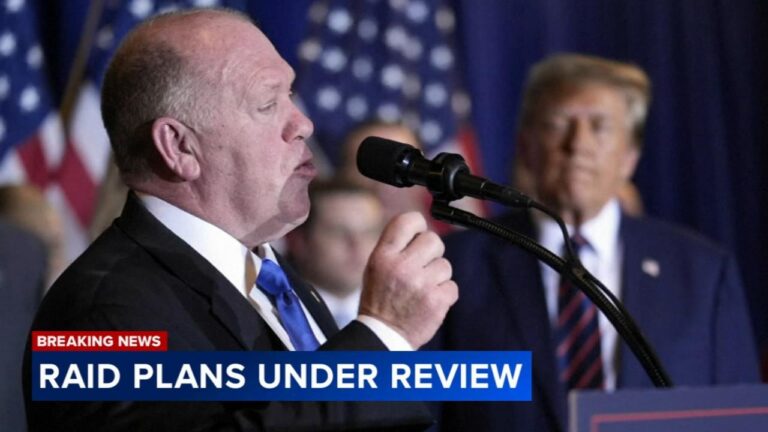Intensified Immigration Enforcement Initiative in Chicago
The Department of Homeland Security has recently amplified its immigration enforcement efforts within Chicago, signaling a notable shift in federal policy application in one of AmericaŌĆÖs most populous cities. This campaign involves a heightened deployment of federal agents conducting focused arrests, primarily targeting undocumented immigrants with prior criminal records. Officials argue that these actions are designed to bolster community safety and curb crime linked to unauthorized immigration.
Core components of this enforcement strategy include:
- Increased patrols by specialized Immigration and Customs Enforcement (ICE) teams
- Enhanced collaboration with local law enforcement for intelligence exchange
- Arrest prioritization based on individualsŌĆÖ criminal backgrounds and assessed threat levels
| Operation Type | Number of Arrests | Focus Group |
|---|---|---|
| Neighborhood Sweeps | 130 | Persons with felony convictions |
| Worksite Inspections | 40 | Undocumented workers |
| Traffic Stops & Checkpoints | 75 | Suspected unauthorized immigrants |
While federal authorities maintain that these measures are lawful and necessary to enforce immigration statutes amid rising concerns over illegal immigration, local leaders and immigrant rights organizations warn that such aggressive tactics may infringe on civil liberties and erode trust between immigrant communities and law enforcement.
Community Trust and Public Safety Concerns Amid Enforcement
Local government officials have expressed serious apprehension regarding the intensified immigration crackdown, cautioning that the approach could damage the fragile trust between immigrant populations and police forces. Several city leaders emphasize that fear of deportation may deter immigrants from reporting crimes or cooperating in investigations, possibly undermining public safety.
Specific worries raised include:
- Heightened friction between immigrant communities and law enforcement agencies
- Reduced crime reporting and reluctance to act as witnesses due to deportation fears
- Growth of underground economies and avoidance of public services by undocumented residents
| Area of Impact | Community Concerns |
|---|---|
| Public Safety | Decline in crime reporting and diminished police trust |
| Social Unity | Increased fear and fractured community bonds |
| Civic Participation | Lower engagement in local programs and events |
Legal Repercussions of New Immigration Policies in Chicago
The recent policy adjustments targeting undocumented immigrants in Chicago have introduced stricter enforcement protocols, particularly emphasizing the detention and removal of individuals with any criminal history, irrespective of the offense’s severity. This represents a meaningful departure from prior enforcement priorities and has sparked concern among legal professionals about the expanded discretionary power granted to immigration officers. Such broad authority may lead to arbitrary detentions and discourage immigrants from engaging in civic activities.
Notable legal consequences include:
- Broadened grounds for detention and expedited removal proceedings
- Potential overcrowding in detention centers due to increased arrests
- Surge in legal battles as immigrants seek asylum or humanitarian relief
- Negative effects on public safety strategies as fear reduces cooperation with local police
| Policy Adjustment | Legal Outcome | Community Impact |
|---|---|---|
| Prioritizing Removal Based on Any Criminal Record | Rise in Detention Orders | Increased Family Separations |
| Expanded Enforcement in Sanctuary Jurisdictions | Reduced Local Control | Weakened Police-Community Relations |
| Targeting Asylum Applicants | Elevated Deportation Rates | Obstacles to Fair Legal Process |
Strategies for Protecting Immigrant Rights During Enforcement Actions
Considering the intensified immigration enforcement, it is essential for immigrants and their advocates to stay informed and prepared. Understanding oneŌĆÖs legal rights during encounters with immigration officials is critical. Individuals should always inquire if they are free to leave and request to see a valid warrant before permitting entry into their homes.Carrying identification and critically important documents securely can facilitate legal processes, but sharing facts should be done cautiously to avoid self-incrimination or unneeded exposure. Consulting with experienced immigration attorneys or trusted organizations can provide vital support and guidance.
Robust community networks are indispensable in safeguarding vulnerable populations. Creating local support systems for sharing information, emergency contacts, and legal resources empowers individuals to respond effectively to enforcement activities. The table below offers a swift reference for key actions and resources during enforcement encounters:
| Recommended Action | Objective | Suggested Resource |
|---|---|---|
| Confirm Officer Credentials | Verify authenticity of enforcement personnel | Request official badge and warrant documentation |
| Know Your Legal Rights | Guard against unlawful searches or detentions | Legal rights brochures and local legal aid groups |
| Set Up Emergency Contacts | Notify family and legal representatives promptly | Community organizations and trusted advocates |
| Record Interactions | Document encounters for potential legal use | Mobile recording apps, written notes, or audio recordings |
Concluding Perspective on Chicago Immigration Enforcement
The Trump administrationŌĆÖs recent declaration marks a decisive escalation in immigration enforcement efforts, particularly within ChicagoŌĆÖs complex urban landscape.As federal operations intensify, the repercussions for immigrant communities, local law enforcement, and city officials continue to unfold. This progress highlights the ongoing national discourse surrounding immigration policy and enforcement priorities. Stakeholders on all sides are closely monitoring the situation, with further updates anticipated as the enforcement campaign progresses.




